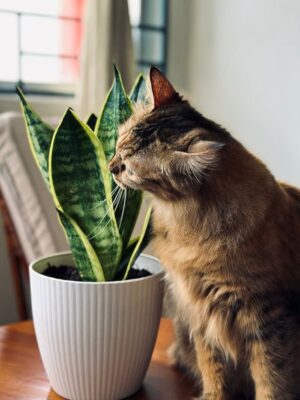Snake plants are popular houseplants that can add color and life to any room. But are they safe for cats?
The answer is it depends on the type of snake plant. Some snake plants (e.g., Sansevieria trifasciata) contain toxic compounds that could harm your cat if ingested. Other snake plants (e.g., Echinocactus grusonii) are non-toxic to cats and may even provide them with nutritional benefits.
However, checking with your vet before adding a new plant to your home is always important!
So, keep reading to find out if snake plants are toxic to cats.
Table of Contents
What Is a Snake Plant?
Snake plants contain a toxin called saponin, which is poisonous to cats. In severe cases, the toxins can cause serious damage to the kidneys, liver, or other organs. If your cat has ingested any part of the snake plant, it is essential to seek immediate medical attention.
Not all parts of the snake plant are equally dangerous. The leaves are more likely to be toxic than the flowers, but all features should be avoided if possible. Depending on the species, some species of snake plants have higher concentrations of saponin than others.

What Are the Symptoms of Toxicity in Cats?
If your cat has eaten a snake plant, it is essential to watch for signs of toxicity. Cats ingested snake plants may experience vomiting, diarrhea, depression, and weakness. In extreme cases, your cat may suffer from seizures or respiratory failure.
If your cat exhibits any of these symptoms after eating a snake plant, immediately take them to the vet for diagnosis and treatment.
Overall, it’s best to keep snake plants away from cats altogether, as they can be potentially very harmful if ingested. To ensure your furry friend’s safety, research which types of houseplants are safe before bringing one into your home. It’s always better to be proactive than reactive when keeping your pet healthy.
Depending on the variety, your cat could experience nausea, vomiting, lethargy, appetite loss, liver damage, breathing difficulties, tremors, and even death. Although snake plants are attractive and easy to care for, it’s not worth risking your pet’s health.
What Should I Do If My Cat Ingests a Snake Plant?
You should contact your veterinarian immediately if your cat has ingested a snake plant. Although there is some debate on whether or not snake plants are toxic to cats, the signs of toxicity in cats can be severe and include drooling, vomiting, diarrhea, difficulty breathing, and even death.
Therefore, it is best to err on the side of caution and seek professional help. Your vet will be able to evaluate your cat’s condition and offer advice for treatment.
It’s important to note that while most people believe that snake plants are toxic to cats, no scientific evidence confirms this. However, given the potential dangers posed by ingesting any foreign material, it’s essential to exercise caution when bringing any houseplant into your home if you have cats.
How Can I Prevent My Cat from Eating a Snake Plant?
Keeping cats away from snake plants is essential, as they can be toxic if ingested. To prevent your cat from eating a snake plant, it’s necessary to make sure the plants are in an area of your home where your cat cannot access them.
This may mean keeping the plants in hanging baskets, on high shelves, or out of reach of your furry friend.
How Can I Keep My Cat Safe Around Snake Plants?
The best way to keep your cat safe around snake plants is by avoiding ingesting the plant’s leaves. If you see your cat chewing on the leaves, moving the plant out of reach or to a spot where your cat can’t access it is crucial.
Additionally, you should avoid exposing your cat to any fertilizers or insecticides that may have been used on the plant, as these can be hazardous to its health.
Finally, it is crucial to monitor your cat for signs of illness. Suppose your cat displays symptoms of vomiting, lethargy, diarrhea, or loss of appetite after coming in contact with a snake plant. In that case, taking them to the veterinarian for a checkup is vital.
Conclusion
It is important to remember that when it comes to determining whether snake plants are toxic to cats, the answer is yes. Although the snake plant itself may not be harmful to cats, there are certain elements found within the plant that can cause serious harm.
If your cat ingests any part of a snake plant, it is vital to take them to the vet immediately for treatment.
In addition, it is crucial to take preventative measures such as monitoring your cat around plants and placing protective barriers between them and the plant.


Hi there colleagues, its impressive article about
teachingand completely defined, keep it up all the time.
Hello, I enjoy reading all of your article. I like to write a little comment to support you.
I pay a visit each day a few blogs and sites to read content, however this weblog
presents quality based writing.
You’re so cool! I do not think I’ve truly read through something
like this before. So great to find somebody with unique thoughts on this topic.
Really.. thank you for starting this up. This web site is something that’s needed on the
web, someone with a little originality!
I’ve been surfing online more than 2 hours today, yet I never found any interesting article like yours.
It’s pretty worth enough for me. Personally, if all site owners and bloggers
made good content as you did, the net will be a lot
more useful than ever before.
My relatives every time say that I am wasting my time here at net, but I know I am getting
know-how everyday by reading such pleasant articles.
Hey very interesting blog!